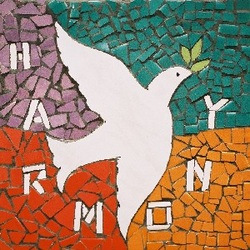 I recently discovered Twenty Two Prayer Poems for Caregivers by Donna Iona Drozda. I commend it as a great gift for a caregiver. This prayer in particular has been meaningful for me lately. Harmony and Harmlessness I pledge to do no harm. Dear One, It feels as though I need to protect myself. It feels as though I am being attacked. Wherever I go at this time it feels as though I am an outsider. I am bereft at hope and I fear that all of my attempts to Learn to walk in balance are for naught. I look about me and try as I may to see the beauty May eyes seem magnetized To the pain and suffering and ugliness. Humbly I ask that You Give me new eyes in this moment. Remind me that this world is all an illusion Remind me that nothing real can be threatened. Teach me to forgive the world. Teach me to forgive myself. Show me how to correct my thinking. Bring me back to balance. I am willing to step back today and let You lead the way. I am willing to be taught... There is another way of looking at the world. I am willing to give over my fear. Again and again throughout this day I will be still an instant and go home. I will listen to Your gentle guiding voice. Amen.
0 Comments
This reflection was written over my summer sabbatical. I share it this week in memory of a beloved congregation. I watched a movie this week that reminded me of her. I saw her niece last week. And I'm going to the theater tomorrow with one of her closest friends. When we choose community, we experience life exponentially - the good and the bad, the happy and the sad. Pete electric wheelchair is a hand-me-down from Jean. We remain so very grateful for her life.  A woman on the committee that interviewed me for my current pastoral position was assigned the task of asking me a few questions on behalf of the committee. In the conversation, we got talking about my studies in seminary; she was a classics major in undergrad who went on to teach middle school students. She was retired at this point, enjoyed reading and gardening. She had two large, grey poodles who I would later find out were trained as therapy dogs. The older was a bit better at visiting people in the hospital; she was more docile in nature. But the younger, rambunctious one brought the livelihood that many in the nursing home enjoyed. Jean was a breast cancer survivor who found many ways to “give back.” The decision to train her dogs as therapy dogs was one way that she could serve people who were in pain. She was not afraid of pain. She mentored other women going through treatment and she spoke at cancer groups. The first thing I noticed about Jean was her speech pattern. She spoke intentionally with a little rasp in her voice, slowly – very slowly, like she had a hard time getting the words out. Listening in general takes patience so with Jean, we found a tad bit more patience. Jean was a church person. Her parents raised her in the Baptist tradition and she knew her way around the Bible really well. But with her knowledge of the classics, she also knew her way around mythology and world religions. She was the leader of one of the small groups at our church. An interesting group of people who followed the thread of their interests, finding resources along the way. Jean and I spoke often about our theological journeys – how did we go from memorizing bible verses to understanding the Bible as the stories of the faithful as they sought to understand God. Jean and her husband Charlie sat to my right about 7 pews back on the side aisle in church. Always ready to worship, always quick to encourage, and always ready to “help out.” She had served as an elder for years, specifically functioning as the clerk of session (the Presbyterian position on the board of elders who keeps the minutes and keeps the sanity.) She'd served a variety of committees, mostly the mission committee as she was deeply committed to social justice concerns. She and her best friend Mary Ellen were responsible for the Heifer International Booth at the Mission Fair each year. Decorating the booth with farm dolls and replicas of barns, they wore themselves out talking about the gift of a goat or how a few chickens could sustain a family for generations. While Jean was committed to brokenness around the world, she found herself drawn to conversations with people in her immediate sphere of influence – conversations about our personal brokenness. And the church – well, that church has its share of personal pain. So Jean was invited to serve as a Deacon right around the time that I invited the Deacons to begin having a conversation about pastoral care. Many times, the Deacons of churches end up taking on all kinds of “helping” ministries: they organize taping the service, or arranging for chancel flowers or take care of fellowship time. Those ministries are needed, but Jean was asking for more, “How can we be more intentional about providing pastoral care to those in our congregation who are hurting, who are broken?” And thus began our journey from a deacon board who “helped out” to one who befriended others. Jean was a strong leader, some might say strong headed. And yet she couldn't have weighed 120 pounds. She was almost feeble looking, until she shared her opinion of course. She had short, salt and pepper hair that was always styled. She enjoyed make up and jewelry and so a pair of faded jeans, were paired with a yellow and blue long sleeved cotton top was matched with a chunky silver necklace and matching earrings. She wore glasses and had caring, serious, blue eyes decorated with a tasteful amount of mascara and eye liner.  She set about in her own style to rework the board of Deacons, organizing the “families” in the church so as to provide optimal care. She began to distribute the more painful situations: an elderly father died, a child went to college for the first time, a husband diagnosed with MS, surgery on a cancerous tumor or chronic depression or fibromayalsia. Her organizational skills were unmatched and she ran the Deacon Board like a swiss watch – until she was diagnosed with ALS, Amyotrophic Lateral Sclerosis. She was devastated; we were devastated. She and her husband lived on a dead end in Hillsborough, just across the canal from church. She escorted me to their glass enclosed patio – clearly her favorite room in the house. She sat on the couch and I sat in the flowered chair opposite her. We were surrounded by 30 plants that she had tended with her own hands. The feeble, shaky hands that now produce horrible penmanship. She had a list beside her that read: tomatoes garlic book group Beth - why me pills “Jean, how are you?” She began to cry and that was the end of our conversation. I moved to sit beside her on the couch and held her hand while she cried. Occasionally, she would look out the window, attempt to fight back tears and find words. But the tears won. Instead she would reach for another tissue as I squeezed her hand tighter or rubbed her back. From the ALS Association's website: She fed her body with the best organic produce. She exercised religiously. She prayed vigorously. She read voraciously. And yet her body is no longer nourishing her muscles. Beginning with her hands and now that I'm holding one in mine, I can feel the lack of form between her thumb and forefinger. I began to cry too. I can still feel the pain of those 45 minutes together. Not physical pain yet, just raw pain. Pain without words, pain of finding yourself so small in relationship to something so devastating. Pain of life lost too soon. Pain that makes talking about "why me?" unrealistic.
"Well," she said, "I'm going to start dinner now." I kissed her lightly on her forehead and said I'd see her on Sunday. “I love you Jean.” “I love you too,” she said slowly with her signature raspy voice. |
What is this blog about?These are some of the reflections that I am fashioning into a memoir about coming to peace with my husband's diagnosis of multiple sclerosis.
|



